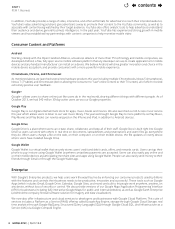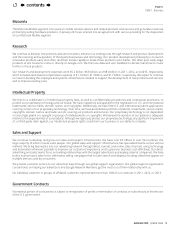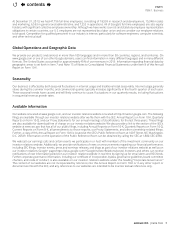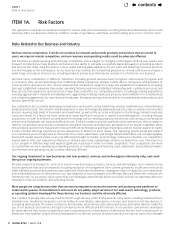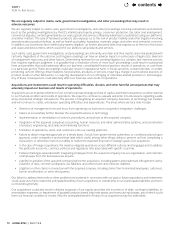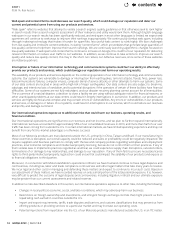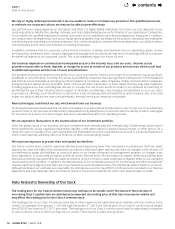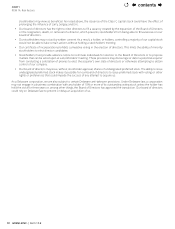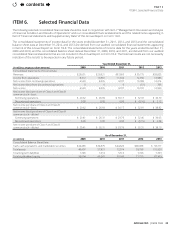Google 2013 Annual Report Download - page 20
Download and view the complete annual report
Please find page 20 of the 2013 Google annual report below. You can navigate through the pages in the report by either clicking on the pages listed below, or by using the keyword search tool below to find specific information within the annual report.14 GOOGLE INC.
PART I
ITEM1A.RiskFactors
Web spam and content farms could decrease our search quality, which could damage our reputation and deter our
current and potential users from using our products and services.
“Web spam” refers to websites that attempt to violate a search engine’s quality guidelines or that otherwise seek to rank higher
in search results than a search engine’s assessment of their relevance and utility would rank them. Although English-language
webspaminoursearchresultshasbeensignicantlyreduced,andwebspaminmostotherlanguagesislimited,weexpectweb
spammers will continue to seek ways to improve their rankings inappropriately. We continuously combat web spam, including
through indexing technology that makes it harder for spam-like, less useful web content to rank highly. We face challenges
from low-quality and irrelevant content websites, including “content farms”, which are websites that generate large quantities of
low-quality content to help them improve their search rankings. We are continually launching algorithmic changes focused on
low-quality websites. If web spam and content farms continue to increase on Google, this could hurt our reputation for delivering
relevantinformationorreduceusertractoourwebsites.Inaddition,aswecontinuetotakeactionstoimproveoursearch
quality and reduce low-quality content, this may in the short run reduce our AdSense revenues, since some of these websites
are AdSense partners.
provide our products and services, which could damage our reputation and harm our operating results.
The availability of our products and services depends on the continuing operation of our information technology and communications
systems.Oursystemsarevulnerabletodamageorinterruptionfromearthquakes,terroristattacks,oods,res,powerloss,
telecommunications failures, computer viruses, computer denial of service attacks, or other attempts to harm our systems. Some
of our data centers are located in areas with a high risk of major earthquakes. Our data centers are also subject to break-ins,
sabotage,andintentionalactsofvandalism,andtopotentialdisruptionsiftheoperatorsofcertainofthesefacilitieshavenancial
diculties.Someofoursystemsarenotfullyredundant,andourdisasterrecoveryplanningcannotaccountforalleventualities.
Theoccurrenceofanaturaldisaster,adecisiontocloseafacilityweareusingwithoutadequatenoticefornancialreasons,or
other unanticipated problems at our data centers could result in lengthy interruptions in our service. In addition, our products and
services are highly technical and complex and may contain errors or vulnerabilities. Any errors or vulnerabilities in our products
and services, or damage to or failure of our systems, could result in interruptions in our services, which could reduce our revenues
andprots,anddamageourbrand.
Our international operations expose us to additional risks that could harm our business, operating results, and
Ourinternationaloperationsaresignicanttoourrevenuesandnetincome,andweplantofurtherexpandinternationally.
Internationalrevenuesaccountedforapproximately55%ofourconsolidatedrevenuesin2013,andmorethanhalfofouruser
trachasbeencomingfromoutsidetheU.S.Incertaininternationalmarkets,wehavelimitedoperatingexperienceandmaynot
benetfromanyrst-to-marketadvantagesorotherwisesucceed.
Most of our Motorola products are manufactured outside the U.S., primarily in China, Taiwan and Brazil. If our manufacturing in
thesecountriesisdisrupted,ouroverallcapacitycouldbereducedandsalesorprotabilitycouldbenegativelyimpacted.We
require suppliers and business partners to comply with the law and company policies regarding workplace and employment
practices, environmental compliance and intellectual property licensing, but we do not control them or their practices. If any of
them violates laws or implements practices regarded as unethical, we could experience supply chain disruptions, canceled orders,
terminations of or damage to key relationships, and damage to our reputation. If any of them fails to procure necessary license
rights to third-party intellectual property, legal action could ensue that could impact the salability of our products and expose us
tonancialobligationstothirdparties.
Moreover, in connection with Motorola Mobile’s operations in Brazil, we have had and continue to have legal disputes and
controversies, including tax, labor and trade compliance controversies and other legal matters that take many years to resolve.
We incur legal and other costs in managing and defending these matters and expect to continue to incur such costs. Based on
our assessment of these matters, we have recorded reserves on only a small portion of the total potential exposure. It is, however,
verydiculttopredicttheoutcomeoflegaldisputesandcontroversies,includinglitigation,inBrazilandourultimateexposure
may be greater than our current assessments and related reserves.
In addition to risks described elsewhere in this section, our international operations expose us to other risks, including the following:
Changes in local political, economic, social, and labor conditions, which may adversely harm our business.
Restrictions on foreign ownership and investments, and stringent foreign exchange controls that might prevent us from
repatriating cash earned in countries outside the U.S.
Importandexportrequirements,taris,tradedisputesandbarriers,andcustomsclassicationsthatmaypreventusfrom
oeringproductsorprovidingservicestoaparticularmarketandmayincreaseouroperatingcosts.
Potential injunctions from importation into the U.S. of our Motorola products manufactured outside the U.S. in an ITC matter.
contents


